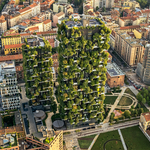WASHINGTON–(BUSINESS WIRE)–Urban forestry is the most urgent challenge for the survival of cities. According to the United Nations Department for Economic and Social Affairs, by 2050 68% of the world’s population is expected to live in urban areas. Urban forests are the key allies in the fight against climate change, providing clean air, mitigating the urban heat island effect, managing stormwater, and much more. This is the main theme of the second edition of the World Forum on Urban Forests hosted in Washington DC from 16 to 20 October 2023.
The 2nd World Forum on Urban Forests (WFUF), developed by FAO, the Italian university Politecnico di Milano, SISEF (Italian Society of Silviculture and Forest Ecology), Arbor Day Foundation, USDA Forest Service and other international institutions with the technical partnership of the practice Stefano Boeri Architetti, has the purpose to support cities worldwide move towards a greener and more sustainable and resilient model of urban development involving one hundred speakers who will talk and confront each other about new models of healthy, inclusive, and resilient cities for all.
Among the protagonists of the “Inclusive Cities” session of the World Forum on Urban Forests the international architect Stefano Boeri shared his “Green Obsession: Trees Towards Cities, Humans Towards Forests” that has recently won the SDG Action Award, the “Oscar” of the 17 UN Sustainable Development Goals which, as part of the United Nations’ SDG Action campaign, rewards initiatives that mobilize, inspire and connect communities in order to promote positive change; and the brilliant and very innovative Italian project of “Parco Italia”, developed and promoted by the research department of the Stefano Boeri Architetti studio (led by Maria Chiara Pastore, Associate Professor at Politecnico di Milano, with Livia Shamir, Senior Researcher) and by the AlberItalia Foundation, which brings together SISEF and the main research bodies in agri-food, forestry and environmental matters.
“We want to present a vision of a future in which cities are transformed through rooftop gardens, backyard community gardens, urban agriculture and tree-lined streets. Increasing the connectivity between woods, gardens and green areas and promoting the creation of ecological corridors are fundamental objectives of the Green Obsession: an attitude that goes beyond individual projects, bringing about a transformative urban forestry strategy and a new perspective of the future of the global urban landscape” says Stefano Boeri, Founder of Stefano Boeri Architetti who has been dealing with urban forestry projects for many years.
Stefano Boeri Architetti is currently working in implementing urban forestry strategies around the world, with Vertical Forests in the Netherlands – with the first Vertical Forest for social housing built in Eindhoven in 2021 and Wonderwoods Vertical Forest under construction in Utrecht. In addition to the architecture design activity, Stefano Boeri Architetti’s work include urban regeneration and master plans for metropolises and large cities, including Geneva, Tirana, Cancun, Cairo and in Italy (Milan, Genoa, Cagliari, Naples, Padua, Taranto and many others).
The Parco Italia project aims to create, connect, protect and expand a network of natural areas, protected areas, ecological corridors, semi-natural terrestrial ecosystems, forests and unprotected woodlands, which can interconnect Italian urban and coastal areas with forests, creating connections between the Alpine and Apennine systems. Parco Italia’s interventions, financed by Amazon, aim to trigger the processes of restoration and regeneration of natural habitats and to be diversified based on the variety of landscapes and the uniqueness of the territories they will touch. Parco Italia also dialogues with existing protected areas, both in terms of active conservation and strengthening of natural spaces.
“Parco Italia is the first national project of this scale in Europe. We need trees to reduce temperatures, improve our environment, air and quality of life. Protected natural areas and forests must be connected to greener cities, in a global biodiversity network. Trees are the starting point of the sustainable cities of the future. The challenge of urban forestry lies in proposing innovative and sustainable urban ecosystems in which living nature and the city intertwine and act as a single organism” declares Maria Chiara Pastore, Head of the Research Department of Stefano Boeri Architetti.
Contacts
Stefano Boeri Architetti
Francesca Raimondi
press@stefanoboeriarchitetti.net






